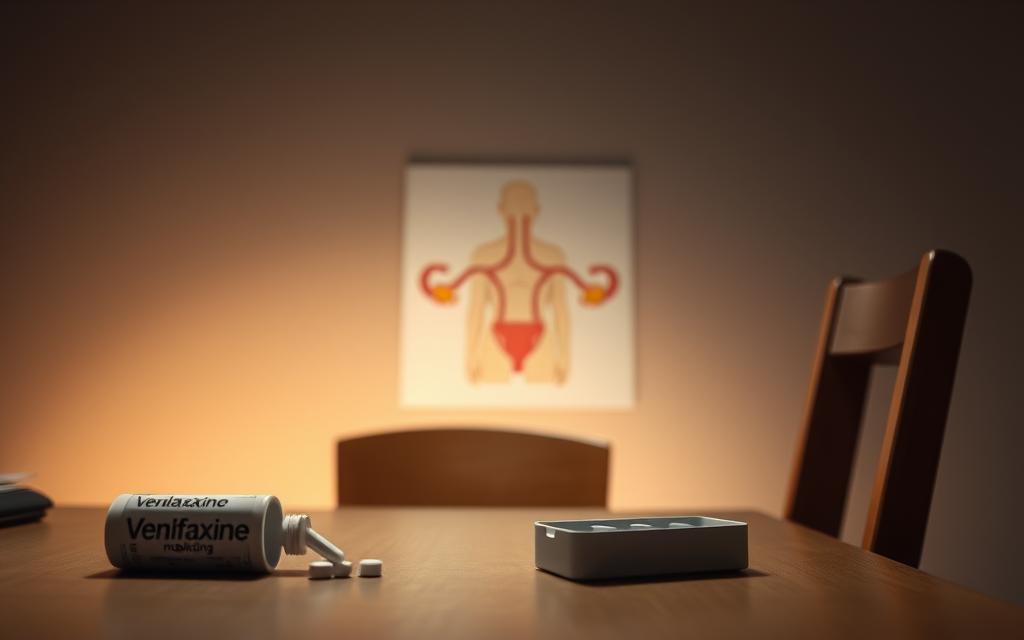Venlafaxine and Erectile Dysfunction: Causes and Solutions
Antidepressants are a crucial treatment option for many individuals dealing with mental health issues. However, some people taking these medications, such as venlafaxine, may experience changes in their sexual health.
One common concern associated with certain antidepressants is erectile dysfunction. This condition can be distressing, affecting not just the physical aspect of a relationship but also the emotional well-being of those involved.
It’s essential to understand that you’re not alone in facing these challenges. Many individuals on antidepressants encounter similar issues. This article aims to explore the relationship between antidepressants and sexual health, discussing potential causes and solutions to help manage these side effects.
What is Venlafaxine and How Does It Work?
Venlafaxine, known by its brand name Effexor, is a serotonin-norepinephrine reuptake inhibitor (SNRI) used to treat various mental health conditions. It is primarily prescribed for major depressive disorder, generalized anxiety disorder, and social anxiety disorder.
Mechanism of Action in the Brain
Venlafaxine works by affecting the levels of two key neurotransmitters in the brain: serotonin and norepinephrine. By inhibiting the reuptake of these neurotransmitters, venlafaxine increases their availability, which helps improve mood and reduce anxiety. This dual-action mechanism is believed to contribute to its effectiveness in treating depression and anxiety disorders.
Common Uses and Benefits
The primary use of venlafaxine is to treat depression and anxiety disorders. Its benefits include improved mood, reduced anxiety, and enhanced overall mental well-being. Clinical trials have shown that venlafaxine is effective in reducing symptoms of depression and anxiety in many patients.
Standard Dosages and Administration
Venlafaxine is typically administered orally, with or without food, once daily. The standard dosage varies depending on the condition being treated and the patient’s response. The following table summarizes the typical dosage ranges:
| Condition | Initial Dose | Maintenance Dose |
|---|---|---|
| Major Depressive Disorder | 37.5-75 mg/day | 75-225 mg/day |
| Generalized Anxiety Disorder | 37.5-75 mg/day | 75-225 mg/day |
| Social Anxiety Disorder | 75 mg/day | 75-225 mg/day |
Dosage adjustments are made based on patient response and tolerability. It’s essential to follow the healthcare provider’s instructions for dosage and administration to ensure the medication’s effectiveness and minimize potential side effects.
Sexual Side Effects of Antidepressants: An Overview
The prevalence of sexual side effects associated with antidepressants is a significant concern for patients and healthcare providers alike. Antidepressants are a crucial treatment for various mental health conditions, but their impact on sexual function can be substantial.
Prevalence Rates Across Different Medications
Different antidepressants have varying rates of sexual side effects. SSRIs (Selective Serotonin Reuptake Inhibitors), for instance, are known to have higher rates of sexual dysfunction compared to some other antidepressants. Studies suggest that up to 70% of individuals on SSRIs may experience some form of sexual side effect.
Types of Sexual Dysfunction Associated with Antidepressants
Sexual dysfunction associated with antidepressants can manifest in several ways, including decreased libido, erectile dysfunction, and delayed ejaculation. These effects can significantly impact an individual’s quality of life and treatment adherence.
Why These Side Effects Matter for Treatment Adherence
The sexual side effects of antidepressants are not just a minor inconvenience; they can lead to discontinuation of treatment. Ensuring that patients are aware of potential side effects and have strategies to manage them is crucial for maintaining treatment adherence.
Venlafaxine Erectile Dysfunction: Causes and Mechanisms
Understanding the mechanisms behind venlafaxine-induced erectile dysfunction is crucial for developing effective management strategies for affected individuals. Venlafaxine, an antidepressant that affects serotonin and norepinephrine levels, is known to have sexual side effects in some patients.
How Serotonin and Norepinephrine Affect Sexual Function
Serotonin and norepinephrine are neurotransmitters that play significant roles in regulating sexual function. Serotonin is known to inhibit sexual activity, while norepinephrine can enhance it. Venlafaxine, by altering the balance of these neurotransmitters, can potentially lead to sexual dysfunction, including erectile dysfunction.

Clinical Research on Venlafaxine’s Sexual Side Effects
Several studies have investigated the sexual side effects of venlafaxine. Research indicates that the incidence of sexual dysfunction varies among patients taking venlafaxine, with some experiencing significant issues.
| Study | Sample Size | Incidence of Sexual Dysfunction |
|---|---|---|
| Smith et al., 2018 | 100 | 35% |
| Johnson et al., 2020 | 200 | 42% |
Risk Factors That Increase Likelihood of Sexual Dysfunction
Certain factors can increase the likelihood of experiencing sexual dysfunction while taking venlafaxine. These include dosage levels, duration of treatment, and individual patient characteristics.
By understanding these factors and the mechanisms by which venlafaxine affects sexual function, healthcare providers can better manage the treatment of patients experiencing erectile dysfunction.
Distinguishing Between Depression-Related and Medication-Induced Erectile Problems
Distinguishing between depression-related and medication-induced erectile dysfunction is a complex issue that requires a comprehensive understanding of both the psychological and physiological factors at play. Depression itself can significantly impact sexual function, making it challenging to determine whether erectile dysfunction is a symptom of the depression or a side effect of the medication used to treat it.
How Depression Impacts Sexual Function
Depression can lead to decreased libido, erectile dysfunction, and other sexual problems due to its effects on neurotransmitters such as serotonin and dopamine, which play crucial roles in sexual arousal and function. Understanding this link is essential for diagnosing the root cause of erectile dysfunction.
Timing of Symptoms Relative to Medication Use
The timing of when erectile dysfunction symptoms begin in relation to starting antidepressant medication can provide valuable clues. If symptoms coincide with the initiation of medication, it may indicate medication-induced erectile dysfunction.
Diagnostic Approaches for Healthcare Providers
Healthcare providers use a combination of patient history, symptom timing, and sometimes trial adjustments to medication to diagnose the cause of erectile dysfunction.
| Diagnostic Factor | Depression-Related ED | Medication-Induced ED |
|---|---|---|
| Timing of ED onset | Often precedes medication | Typically follows medication start |
| Impact of Depression Severity | Correlates with depression severity | No direct correlation |
Medical Interventions for Managing Erectile Dysfunction on Venlafaxine
Erectile dysfunction associated with venlafaxine use can be addressed through various medical interventions. These interventions aim to mitigate the sexual side effects without compromising the antidepressant’s efficacy.
Dosage Adjustments and Their Effects
One approach to managing erectile dysfunction is adjusting the dosage of venlafaxine. Lowering the dose may alleviate sexual side effects while maintaining some level of antidepressant effect. However, this should be done under the guidance of a healthcare provider to avoid withdrawal symptoms or a return of depressive symptoms.
Strategic Timing of Medication
Timing the intake of venlafaxine can also be a strategy. Taking the medication at a time when it is less likely to interfere with sexual activity might help. For instance, taking it in the evening if sexual activity is more common in the morning.
Medication Holidays: Benefits and Risks
Medication holidays, or temporarily stopping the medication, have been suggested as a potential strategy. However, this approach carries risks, including withdrawal symptoms and the potential return of depressive symptoms. It’s crucial to discuss these risks with a healthcare provider.
ED Medications as Adjunctive Treatment
For some patients, using erectile dysfunction medications like sildenafil (Viagra) or tadalafil (Cialis) alongside venlafaxine can be effective. These medications can help counteract the sexual side effects of venlafaxine.
Key considerations include:
- Consulting a healthcare provider before making any changes to medication regimens.
- Understanding the potential benefits and risks of each approach.
- Monitoring the effects of any changes on both depressive symptoms and erectile dysfunction.
By exploring these medical interventions, individuals can work with their healthcare providers to find a balance between managing their depression and maintaining their sexual health.
Alternative Antidepressants with Lower Sexual Side Effect Profiles
Alternative antidepressants offer hope for those struggling with the sexual side effects associated with venlafaxine. For many, the sexual dysfunction caused by antidepressants can be a significant concern, often leading to non-adherence or discontinuation of treatment.
Bupropion (Wellbutrin) as an Alternative
Bupropion is known for having a lower incidence of sexual side effects compared to other antidepressants. Studies have shown that it may even improve certain aspects of sexual function. According to a study published on PubMed Central, bupropion’s unique mechanism of action may contribute to its favorable sexual side effect profile.
Mirtazapine and Its Sexual Side Effect Profile
Mirtazapine is another antidepressant that has been associated with a relatively low risk of sexual side effects. Its pharmacological profile, which includes antagonism at central presynaptic α2-adrenergic inhibitory receptors, may contribute to its lower incidence of sexual dysfunction.
Newer Antidepressants and Their Impact on Sexual Function
Newer antidepressants, such as those in the class of serotonin modulators, may also offer benefits in terms of reduced sexual side effects. Research into these newer agents is ongoing, providing hope for improved treatment options.
The Process of Safely Switching Medications
Switching from venlafaxine to an alternative antidepressant should be done under the guidance of a healthcare provider to minimize withdrawal effects and ensure continued therapeutic efficacy. A gradual tapering of the current medication while introducing the new one is typically recommended.
| Antidepressant | Sexual Side Effects | Mechanism |
|---|---|---|
| Bupropion | Lower incidence | Norepinephrine-dopamine reuptake inhibition |
| Mirtazapine | Relatively low | α2-adrenergic antagonism |
| Venlafaxine | Higher incidence | Serotonin-norepinephrine reuptake inhibition |
By considering alternative antidepressants and carefully managing the transition, individuals can potentially mitigate the sexual side effects associated with venlafaxine, improving their overall quality of life.
Lifestyle Modifications to Improve Sexual Function
Lifestyle modifications offer a promising approach to enhancing sexual wellbeing for those on venlafaxine. By incorporating healthier habits into daily routines, individuals can potentially mitigate some of the sexual side effects associated with this medication.
Exercise Regimens That May Help
Regular physical activity is known to improve overall cardiovascular health, which is closely linked to sexual function. Exercise regimens that include a mix of aerobic activities, such as running or cycling, and strength training can enhance blood flow and boost overall energy levels. This, in turn, may help alleviate some of the sexual dysfunction experienced by individuals on venlafaxine.
Some beneficial exercises include:
- Kegel exercises to strengthen pelvic floor muscles
- Aerobic exercises like jogging or swimming to improve cardiovascular health
- Yoga or Pilates to enhance flexibility and reduce stress
Dietary Changes and Supplements
Diet plays a crucial role in overall health, including sexual function. Nutritional adjustments can help improve sexual wellbeing. Foods rich in antioxidants, such as fruits and vegetables, can enhance blood flow and overall health. Additionally, certain supplements like L-arginine and ginseng may help improve erectile function, although it’s essential to consult with a healthcare provider before adding any supplements to your regimen.
Alcohol, Smoking, and Their Impact
Lifestyle factors such as alcohol consumption and smoking can significantly impact sexual function. Reducing or eliminating alcohol intake and quitting smoking can lead to improvements in overall sexual health. Both alcohol and smoking are known to negatively affect cardiovascular health and blood flow, which are critical for healthy sexual function.
Stress Reduction Techniques
High levels of stress can exacerbate sexual dysfunction. Engaging in stress reduction techniques such as meditation, deep breathing exercises, or mindfulness can help alleviate stress and potentially improve sexual function. These practices not only reduce stress but also promote overall wellbeing, contributing to a healthier sexual life.
Psychological Approaches and Relationship Strategies
A comprehensive approach to managing venlafaxine-induced erectile dysfunction involves both psychological interventions and relationship counseling. This multifaceted strategy can help individuals regain their sexual health and strengthen their relationships.
Effective Communication with Partners
Open and honest communication with partners is crucial. It helps in understanding each other’s needs and feelings, thereby reducing stress and anxiety related to erectile dysfunction.
- Discuss feelings and concerns openly.
- Share experiences and listen actively.
- Work together to find solutions.
Expanding Intimacy Beyond Intercourse
Focusing on other forms of intimacy can help. This includes emotional closeness, sensual touch, and other forms of sexual expression.
- Engage in activities that promote emotional bonding.
- Explore sensual activities that are not intercourse-focused.
Sex Therapy and Counseling Options
Sex therapy can be highly beneficial. It provides a safe space to address sexual issues under the guidance of a professional.
Sex therapy can help individuals and couples understand and address the psychological aspects of erectile dysfunction.
Building Confidence and Reducing Performance Anxiety
Building confidence and reducing performance anxiety are key aspects of managing erectile dysfunction. Techniques such as cognitive-behavioral therapy (CBT) can be effective.
By incorporating these psychological approaches and relationship strategies, individuals can better manage the sexual side effects of venlafaxine and improve their overall sexual wellbeing.
When and How to Discuss Sexual Side Effects with Your Doctor
If you’re experiencing sexual dysfunction while taking venlafaxine, preparing for a productive conversation with your doctor can make a significant difference. It’s essential to approach this conversation with a clear understanding of your symptoms and concerns.
Preparing for Your Appointment
Before discussing sexual side effects with your doctor, it’s helpful to prepare by:
- Writing down your symptoms and when they started
- Noting any changes in your medication or dosage
- Listing any other medications or supplements you’re taking
- Preparing questions to ask your healthcare provider
Important Symptoms to Report
When discussing your sexual side effects, be sure to report:
- The specific symptoms you’re experiencing, such as erectile dysfunction or decreased libido
- How these symptoms are affecting your daily life and relationships
- Any factors that seem to improve or worsen your symptoms
According to research, openly discussing sexual side effects can lead to better management and treatment adjustments.
Questions to Ask Your Healthcare Provider
To make the most of your appointment, consider asking:
- What are the potential causes of my sexual dysfunction?
- Are there alternative antidepressants with fewer sexual side effects?
- Can adjusting my dosage or timing help alleviate symptoms?
Following Up on Treatment Changes
After discussing your sexual side effects and potentially making changes to your treatment plan, it’s crucial to follow up with your healthcare provider to:
- Report any changes in your symptoms
- Discuss the effectiveness of any new treatments or adjustments
- Address any new concerns or side effects

By being prepared and proactive, you can work with your healthcare provider to find a solution that balances your mental health treatment with your sexual wellbeing.
Conclusion: Finding Balance Between Mental Health and Sexual Wellbeing
Maintaining a balance between mental health treatment and sexual wellbeing is crucial for overall quality of life. While venlafaxine and other antidepressants can effectively manage depression and anxiety, their sexual side effects can be challenging. Understanding the causes and mechanisms of these side effects is the first step towards managing them.
Various strategies can help mitigate the sexual side effects associated with venlafaxine. Adjusting dosages, switching to alternative antidepressants like bupropion or mirtazapine, and incorporating lifestyle modifications can improve sexual function. Psychological approaches, including effective communication with partners and sex therapy, also play a significant role in enhancing sexual wellbeing.
It’s essential for individuals to discuss their sexual side effects with their healthcare provider to explore available treatment options. By working together, individuals can find a balance that supports both their mental health and sexual wellbeing, leading to a more fulfilling life.
